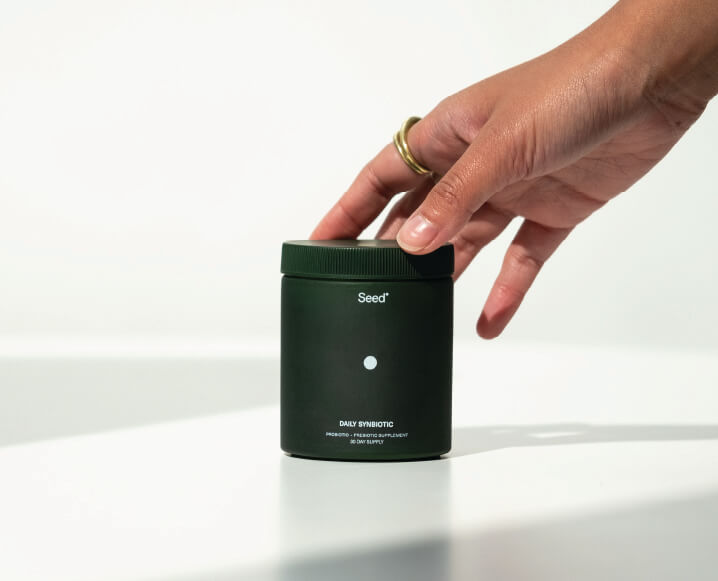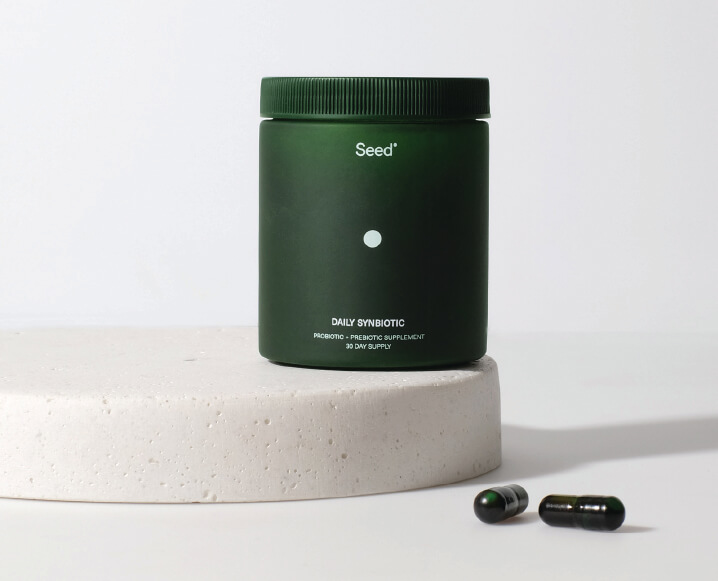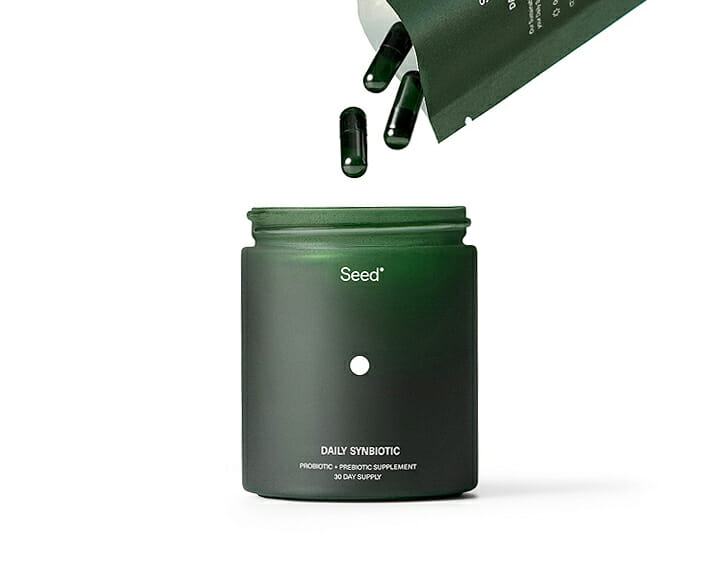
December 07, 2020 at 11:00AM

We talk a lot about probiotics and your gut, but the future of wellness if all about understanding how the benefits of all those bacterial strains extend far beyond your digestive health. Bacteria is actually a booming business with so many emerging health solutions coming from new studies and trials that some are calling it a new frontier in science.
One company at the forefront is Seed, an exciting wellness brand we’ve been following since their launch. Seed’s revolutionary product standards include ambitious plans to harness all this new science into the kinds of supplements we all dream of — and we’re paying close attention.
There are few nutritionists we trust more than Kelly Leveque — one of the coolest science nerds we know. Kelly has followed Seed so intensely that she actually decided to invest. We asked her to unpack the science behind Seed’s Daily Synbiotic – though we’d be tempted to buy the product based on packaging alone – that’s one stylishly sustainable jar! Here’s Kelly…
When it comes to supplements we all know quality is key, but differentiating between the best brands can seem impossible — whether it’s a multivitamin, Omega-3 or a probiotic. One brand might stand for transparency, but deliver subtherapeutic doses while another brand might be backed by your favorite influencers, but use synthetic formulations with poor bioavailability.
ADVERTISEMENT
ADVERTISEMENTKate Spade Autumn/Winter Sale |

Probiotics are amongst the most confusing supplements to choose because many of us perceive ‘high quality’ to mean the highest price, largest CFU count and a refrigerated shelf location. Sadly, none of those factors accurately determines your probiotics’ quality or health outcomes.
Seed is revolutionizing the probiotics industry by providing scientifically-validated probiotics with whole-body benefits. I was so impressed with founders Ara Katz and Raja Dhir that when given the opportunity to invest in Seed I jumped at the chance. From my perspective, Seed is more than an industry leader, they are elevating the entire space, demanding transparency from their partners and investors and providing a PhD level of education to consumers on their site.
So let’s talk about the Daily Synbiotic…
The Truth About Probiotic Strains + Your Health
The short story is that more probiotic strains aren’t better, specific strains clinically-studied for specific health outcomes do.
Seed’s Daily Synbiotic contains 24 clinically and scientifically-studied probiotic strains selected for specific health outcomes. Supported by multiple double-blind, randomized, human clinical trials, each strain is included in the product at their clinically-studied dosage. These specific health outcomes include digestive health, skin health, heart health, gut immune function, gut barrier integrity, and micronutrient synthesis. Did you know a probiotic could do all that?
Does CFU Even Matter?
Fact: a tablespoon of sauerkraut juice serves up close to a trillion CFU and your favorite fermented foods are offering up comparable amounts and strains like lactobacillus acidophilus without strategic strain dosing. So it may be tempting to buy an expensive probiotic that boasts a 200 billion CFU count, but what we’re looking for is not simply ‘more’ strains.
Seed’s Daily Synbiotic actually totals 53.6 billion AFU. Instead of using the marketing term CFU, Seed measures in AFU or Active Fluorescent Units with flow cytometry, a process where probiotic cells are tagged with fluorescent ‘markers’ and counted by a laser to calculate a more precise measurement of all viable cells, including ones that are efficacious, but not necessarily culturable. Using AFU is just another way Seed is redefining standards in transparency and technology.
ADVERTISEMENT
ADVERTISEMENTSports Direct Free Delivery on All Orders! |
Brands who only use CFU are potentially counting the probiotic cells in their product that aren’t culturable and may not benefit the consumer or their gut at all.
On Strains for Specific Health Outcomes
For the Heart: Seed included multiple strains of bacteria that have shown clinical significance in lowering total cholesterol, low density lipoproteins inflammatory biomarkers to support heart health.
For Glowing Skin: Looking for a clear dewy complexion? Seed included four skin specific strains known for improving texture and clarity and it’s always my first recommendation to clients before they pop prescribed off-label treatments like spironolactone.
Healthy Pregnancies: The reality is our microbiome influences the health of our entire body through the production of byproducts, like butyrate, an antiinflammatory short chain fatty acid but it also influences our micronutrient synthesis, my increasing the endogenous production of nutrients like the 5-MTHF (folate). Folate (not the synthetic folic acid) is a critical nutrient for fetal development and neural tube closure and a reason why Seed is a strong recommendation for clients trying to conceive and throughout pregnancy.
For Healthy Digestion: Don’t worry, Seed’s Daily Synbiotic strain selection was made to support all your favorite gut benefits like ease of elimination, decreased bloating, improved transit time and increased intestinal barrier integrity, but they have also gone above and beyond in choosing validated strains.
 Seed’s strains have collectively been studied in 16 strain-specific, double-blind, placebo-controlled, published human studies conducted in the United States, United Kingdom, Italy, Spain, and Japan and the studies are published in peer-reviewed journals like Journal of Clinical Gastroenterology, Nature and JAMA Dermatology.
Seed’s strains have collectively been studied in 16 strain-specific, double-blind, placebo-controlled, published human studies conducted in the United States, United Kingdom, Italy, Spain, and Japan and the studies are published in peer-reviewed journals like Journal of Clinical Gastroenterology, Nature and JAMA Dermatology.
‘Just because a probiotic is refrigerated doesn’t mean it’s better.’
On survivability and stability | Just because a probiotic is refrigerated doesn’t mean it’s survival is better, most often, it means it was cultured at that temperature and needs it to maintain survival which isn’t convenient for users and doesn’t bode well for a hot acidic trip through your digestive tract.
Contrary to popular belief, your probiotics don’t need to colonize your microbiome to work; they just need to survive digestion. Seed’s Daily Synbiotic was the first to harness the ViaCap™—a 2-in-1 capsule delivery technology that nests a Probiotic Inner Capsule inside a Prebiotic Outer Capsule. This outer chlorophyllin capsule offers an additional barrier against moisture, heat, light, and oxygen along with food for your microbes. The inner shell utilizes technological innovations like lyophilization or freeze drying to keep its probiotics shelf-stable and dormant state until they reach the digestive tract where they are reactivated.
The good news is that, once there, they simply need to travel through your GI tract, interacting with your immune cells, dendritic cells, gut cells, dietary nutrients, and existing bacteria to directly and indirectly deliver benefits. The bad news is that many consumers don’t realize their probiotics might be cultured in a known allergen like dairy. Thankfully, Seed strains have GRAS and/or QPS (Qualified Presumption of Safety) status under the European Food and Safety Authority (EFSA) and are not cultured with, and are free from the 14 Classes of Allergens.
Seed’s Revolutionary Sustainability Measures
Seed has set out to leave the world a better place than how they found it, going beyond simply using recycled packaging and instead working with biomaterials and unique applications of upcycled waste as an alternative to plastic.
But it’s Seed Labs that makes the biggest promises for our future generations, this arm of Seed is set out to develop novel applications for bacteria by partnering with innovators to solve some of the biggest problems facing planet earth — including our dying honey bee population. With the use of BioPatties, delivering probiotics to honey bees shows immense potential in tempering the effects of neonicotinoid insecticides to improve survival rates and restore our honey bee populations around the world.
ADVERTISEMENT

ADVERTISEMENT
Anya Hindmarch - I AM A PLASTIC BAGIt’s this type of foresight and innovation that will help ensure a better future for each of us. Remember you have a choice; every time you make a purchase you are essentially voting for the sustainable future you want.
This story is brought to you in partnership with Seed. From time to time, TCM editors choose to partner with brands we believe in to bring our readers special offers. The Chalkboard Mag and its materials are not intended to treat, diagnose, cure or prevent any disease. All material on The Chalkboard Mag is provided for educational purposes only. Always seek the advice of your physician or another qualified healthcare provider for any questions you have regarding a medical condition, and before undertaking any diet, exercise or other health-related programs.
The post The Future of Wellness: Kelly Leveque on the Supplement That Changes Everything appeared first on The Chalkboard.
Continue Reading…
Author The Chalkboard | ChalkBoardMag
Selected by CWC
ADVERTISEMENT
ADVERTISEMENTUp to 30% off Gift Sets |











